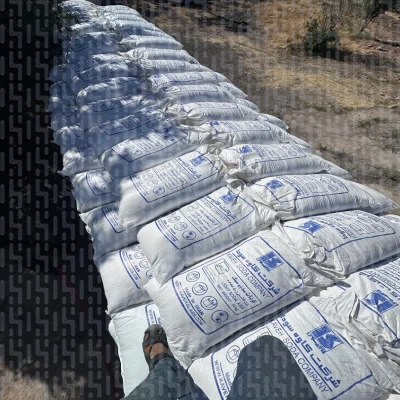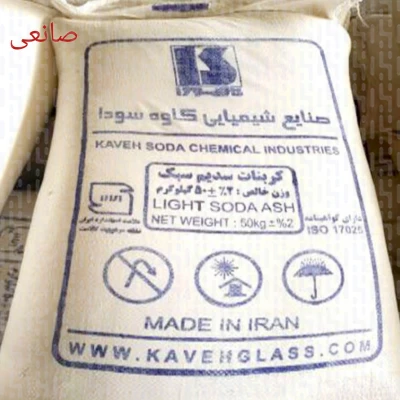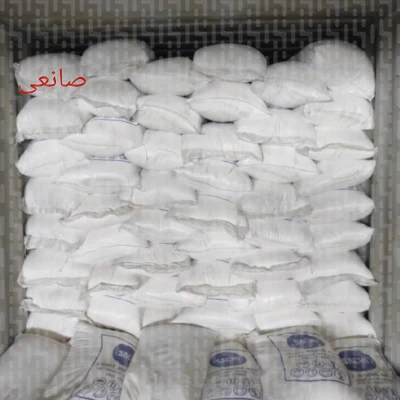Sodium carbonate (soda ash)
Sodium carbonate or soda ash is a chemical compound with diverse applications that is an important material in many industries and chemical processes.
Soda ash was first produced in Europe from plant ashes in a process called "soda ash". This process is widely used in the glass and soap-making industries.
What is sodium carbonate, or baking soda?
Baking soda is the disodium salt of carbonic acid with alkaline properties. This mineral compound consists of sodium and carbonate and is available in solid, crystalline, powder, and odorless forms. Also, this substance has a high moisture absorption property.
All forms of this inorganic compound are white, odorless, and water-soluble salts that produce alkaline solutions in water.
Properties and Properties of Sodium Carbonate
Sodium carbonate is a chemical compound with unique properties and characteristics, and therefore, it has a variety of applications in different industries. The table below lists some of its most important properties and benefits.
|
Description |
Features and properties |
|
Sodium carbonate |
IUPAC name of the compound |
|
Soda ash, washing soda, soda crystals, sodium trioxocarbonate |
Other names |
|
Na2CO3 |
Chemical formula |
|
105.9888 g/mol (anhydrous) |
Molar mass |
|
White solid |
Appearance |
|
Odorless |
Odor |
|
2.54 g/cm3 (25 °C, anhydrous) |
Density |
|
851 °C (1564 °F; 1124 K) (anhydrous) |
Melting point |
|
34.07 g/mL (27.8 °C) |
Solubility in water |
|
Soluble in aqueous alkalis |
Solubility |
|
pKa 10.33 |
Acidity |
|
1/485 (anhydrous) |
Refractive index |
|
3.4 cP (887 °C) |
Viscosity |
|
Octahedral |
Coordination form |
Sodium carbonate applications
The light and sometimes decahydrate types of soda are used in the production of detergents due to their disinfectant properties. In addition to being a mold-killing agent on wood, this substance is used in various industries such as brickmaking, metal production, artificial leather, paper, battery manufacturing, and casting.
Also, in the glassmaking industry, light and heavy types of soda are used to reduce the melting temperature of silica and as a source of sodium ions for glass production.
Sodium carbonate can be effective in removing calcium and magnesium ions that cause water hardness, as well as neutralizing possible acids that cause numerous problems in the drilling industry.
Sodium carbonate production methods
Sodium carbonate can be produced using various processes such as Solvay, Leblanc, and the extraction method from natural sources.
The Leblanc method is an old process that is obsolete today due to the production of many pollutants. The Solvay method is one of the most economical and widely used methods of producing soda ash.
In this process, limestone, salt, and natural gas are used as raw materials, and ammonia is used as a cyclic reagent. The extraction method from natural sources is also based on the extraction and processing of natural minerals containing sodium carbonate.
Difference Between Sodium Carbonate and Sodium Bicarbonate
Despite the similarities in their names, sodium carbonate and sodium bicarbonate are distinct substances with different properties and uses. We will discuss the differences between these two substances in the table below.
|
Sodium carbonate |
Sodium Bicarbonate |
|
AKA soda ash or washing soda |
AKA Baking Soda |
|
Chemical formula: Na2CO3 |
Chemical formula |
|
Chemical formula: Na2CO3 |
Composed of sodium, acid, and hydrogen |
|
Strong base |
A weak, monoprotic base |
|
Used to neutralize acidic solutions |
Used as a temporary fire extinguisher, deodorizer, cleaner, or exfoliant |
|
Used for body processes and reactions |
The essential component in the body to regulates and neutralizes high blood acidity |
Types of Sodium Carbonate
The most common classification of sodium carbonate is based on its density and particle size, which is divided into two types: light sodium carbonate and heavy sodium carbonate.
These two types are identical in terms of chemical properties, but due to differences in their physical properties, they are used in different industrial applications.
Heavy Sodium Carbonate
Heavy sodium carbonate is obtained by hydrating light sodium carbonate to monohydrate (Na2CO3.H2O) and then dehydrating it to produce a product with increased crystal size and density.
Its common applications include pH adjustment in industrial processes, water and wastewater treatment, glass production, metal refining, detergent and soap production, copper and steel industries, food industries, and cosmetics and hygiene industries. Heavy soda ash is mostly used in solid form.
Light sodium carbonate
This type of sodium carbonate contains less than 0.5% sodium chloride and is produced in powder and light form. It is also used as a pH regulator in the chemical industry and is often known as "high-speed sodium carbonate".
The difference between heavy and light sodium carbonate
The main difference between heavy and light sodium carbonate is in density, type of application, and particle size, so that heavy sodium carbonate is coarser than the light type and has a higher density, but they do not differ from each other in terms of chemical composition.
In addition, the light type is more useful in chemical reactions and detergent production due to its larger contact surface, while the heavy type is preferred in the glass industry due to its better flowability and lack of dust.
Types of Sodium Carbonate Based on Hydration
Another classification is based on the varying degrees of hydration or hydration of sodium carbonate, which depends on the number of water molecules attached to the crystal structure of this compound.
Despite their similarity in chemical structure, these forms differ in physical properties such as molecular weight, stability, and specific applications.
This classification includes anhydrous sodium carbonate, sodium carbonate monohydrate (containing one water molecule), sodium carbonate heptahydrate (containing seven water molecules), and sodium carbonate decahydrate (containing ten water molecules), each of which is formed under specific conditions and can have different physical properties.
Types of Sodium Carbonate Based on Application
Due to its alkaline properties and reactivity with other substances, this substance is used in various industries and various types. Below, we will discuss some of the types of this substance.
Edible Sodium Carbonate
Edible sodium carbonate has many applications in food industry processes. This substance is used to control and regulate the acidity and sourness of foods.
In carbonated drinks, it induces a feeling of coolness, and in the pasta and noodle industry, it improves the texture of the product.
Other uses of edible sodium carbonate include creating tenderness in processed meats, stabilizing, bulking the dough, and preventing the product from clumping.
This type of sodium carbonate is obtained from baking soda under temperature conditions of 200 degrees Celsius.
Industrial Sodium Carbonate
The purity of industrial grade material ranges from 98 to 99.5 percent and is mainly divided into two types: light, with a density of about 500-600 kg/m3, and heavy, with a density of about 1000-1100 kg/m3.
Laboratory Sodium Carbonate
Laboratory grade sodium carbonate is used to calibrate instruments, perform accurate acid and base titrations, adjust and maintain pH in biochemical and chemical experiments, identify or quantify other substances, and synthesize chemicals.
It is usually more than 99.9% pure, and the exact amount of impurities is listed on the product label to ensure the accuracy of test and research results.
Top 10 Sodium Carbonate Suppliers in Iran
Sustainable and high-quality supply of sodium carbonate, as a key raw material in various industries, plays a vital role.
In this regard, several companies in the country are engaged in the production and supply of this important chemical material, among which, some have a special place due to their high production capacity, product quality, and extensive distribution network, and some of them are mentioned below.
|
Shimico |
1 |
|
Sodium carbonate Semnan |
2 |
|
Kimia Pars Shayankar |
3 |
|
Pegah Mohit Arian |
4 |
|
PTT chemical |
5 |
|
PETRO KIMIA PEYVAND |
6 |
|
bismoot |
7 |
|
Kavehglass |
8 |
|
Kimia tejarat Fajr |
9 |
|
SSACO |
10 |
SACHI Sodium Carbonate: Premium Quality for Global Industries
SACHI Sodium Carbonate is a premium soda ash brand from Iran, boasting 98% purity in both light and dense grades.
Produced using the advanced Solvay process, it serves global industries like glass manufacturing, detergents, and textiles.
With eco-friendly production and robust export to markets such as South Korea, Indonesia, and the UAE, SACHI delivers unmatched quality and reliability for diverse industrial applications.
SACHI Sodium Carbonate Highlights
- High Purity: Offers 98% purity in both light and dense grades, ensuring top performance in industrial applications.
- Advanced Production: Manufactured using the eco-friendly Solvay process, optimizing resource use and minimizing environmental impact.
- Versatile Applications: Ideal for glass manufacturing, detergents, textiles, and chemical production, meeting diverse industry needs.
- Global Reach: Exported to key markets including South Korea, Indonesia, and the UAE, with a robust international distribution network.
- Scalable Capacity: Produces 320,000 tons annually, with potential expansion to 1 million tons to meet growing global demand.
- Sustainable Practices: Leverages Iran’s local mineral resources, reducing raw material exports and supporting regional economic growth.
Packaging and Storage of Sodium Carbonate
To prevent moisture penetration and contamination, sodium carbonate is usually packaged in multilayer paper or polypropylene bags.
It is noteworthy that the storage warehouse for sodium carbonate should also be dry, cool, and well-ventilated to prevent clumping and moisture absorption.
It is also necessary to avoid exposing the packages to direct sunlight and heat sources.
Proper Packaging of Sodium Carbonate
Proper packaging of sodium carbonate is of particular importance because safe and proper storage and transportation of packages can maintain and guarantee the quality of the product.
Multilayer bags containing an inner polyethylene layer prevent moisture penetration, and polypropylene (PP) bags with a laminate coating are usually used for packaging heavy sodium carbonate, which has very high strength and is resistant to tearing and abrasion.
Also, for the transportation and storage of large quantities of sodium carbonate, large bags with a capacity of 500 kg to 2 tons are used.
Storage, loading, and delivery of sodium carbonate
Sodium carbonate is incompatible with acidic materials, so this point should be taken into account during storage. When loading and using sodium carbonate, appropriate, safe equipment and specialized personnel should be used to prevent damage to packages and dust emission.
Delivery should be carried out in compliance with the safety principles of chemical transportation and on time, and it should be ensured that the recipient is aware of the correct storage conditions.
Buying and selling sodium carbonate
Buying and selling sodium carbonate is usually done through domestic manufacturers or importers, and its price is affected by factors such as purity, type of packaging, order volume, and market conditions.
Also, due to the use of sodium carbonate in various industries, buying and selling this material is very popular. For advice and buying sodium carbonate, you can contact our consultants at Shimico, who are in contact with sodium carbonate production and sales centers.
Competitive price of sodium carbonate
The factors affecting the price of sodium carbonate in a competitive market include purity, packaging type, order volume, and transportation costs.
In the Iranian chemical market, the price of sodium carbonate on the commodity exchange is affected by factors such as supply and demand, exchange rates, and production and transportation costs.
Therefore, manufacturers and suppliers are trying to offer reasonable prices while maintaining quality to attract customers.
The most important foreign brands of sodium carbonate
Among the reputable and well-known brands around the world that are active in the production and supply of sodium carbonate are SRLChem, Aldrich, VITSZEE, NICE, Rankem, ASES, KSFE, and Merck sodium carbonate.
Conclusion
Sodium carbonate is one of the most important industrial materials obtained from the ashes of plants that grow in sodium-rich soils.
Due to its alkaline and special properties, this substance has many applications in the glassmaking, detergent, and food industries.
Understanding the production methods, proper packaging, and considerations related to the purchase and sale of this product is of great importance for activists in related fields.
















